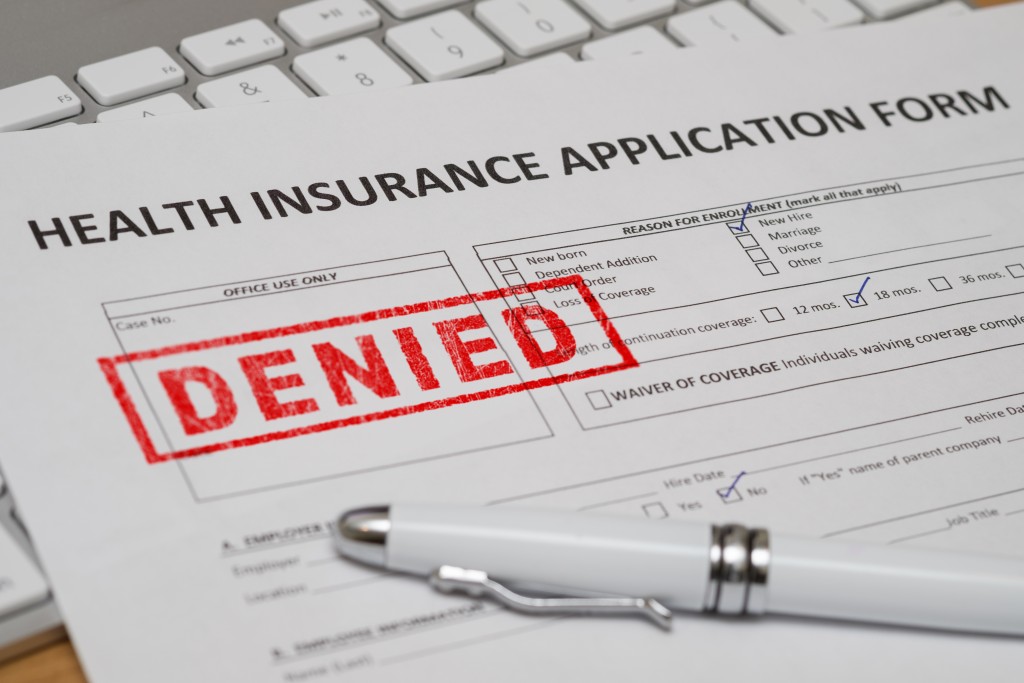Daniel Workman
Just because you’re healthy doesn’t mean that insurers will approve your individual health insurance application.
Based on a 2009 report from The Commonwealth Fund, 26 percent of adults age 19 to 64 were refused health insurance on the individual market or charged higher premiums over a three-year period even though they had no health problems.
Health care reform will force insurers to accept all applicants starting in 2014. Currently, five states (Maine, Massachusetts, New Jersey, New York and Vermont) mandate that a full range of guaranteed-issue health insurance policies be made available, according to the Kaiser Family Foundation. Idaho, Michigan, Ohio, Oregon, Rhode Island, Utah, Washington and West Virginia have more limited guaranteed-issue rules. Insurers in 38 other states plus the District of Columbia routinely decline applicants based on their health status.
Pre-existing medical conditions
Insurers can automatically deny health insurance if you have a serious chronic illness such as AIDS, cancer or heart disease. Other uninsurable health conditions include pregnancy, rheumatoid arthritis and sleep apnea. Health coverage also may be refused because of medical problems for which you haven’t seen a doctor or completed treatment or that a doctor can’t explain.
Even after full recovery, according to California’s Department of Insurance, coverage restrictions or higher premiums may apply for such previous conditions as:
- Ear infections controlled with medications.
- Joint sprains and strains.
- Mild and infrequent migraine headaches.
If you have hay fever, your coverage may exclude all respiratory illnesses, according to HealthReform.gov.
If your application is denied
Based on your medical history, health insurance providers can deny coverage. But what if your medical record is inaccurate or contains wording that’s prone to misinterpretation?
Legally, you can ask for and receive a copy of your medical record from a health care provider.
First, find out whether the provider requires specific procedures, including request forms and fees. If the provider refuses to send copies of your medical record, you can ask that a different health care professional review that decision.
Be aware that medical records often are filled with technical jargon. While providers aren’t obligated to provide plain-language translations, you can ask for a summary or explanation of your record.
How to correct your medical record
If you find inaccuracies or notice missing information, the “Privacy Rule” under the Health Insurance Portability and Accountability Act (HIPAA) empowers you to amend your medical record. However, you don’t have the right to change your medical record or delete information already on file, according to Georgetown University’s Center on Medical Record Rights and Privacy. For example, if you disagree with your doctor’s diagnosis of major depression, you’re limited to adding information like a second professional opinion or proof that supports your position.
If the health care provider agrees, the new information is added to your record.
Otherwise, the provider will refuse your amendment request and explain why. You can’t appeal that decision, but you can give your health care provider a brief written explanation of why you disagree. The provider must attach that statement to your medical record, and can add its note that disputes your assertions, according to the Center on Medical Record Rights and Privacy.
How to correct your Medical Information Bureau record
Insurance underwriters also check answers you give when applying for health insurance against medical data from the Medical Information Bureau.
The bureau tracks medical information previously provided to participating insurance companies over the past seven years. If you omit information on an insurance application, the bureau alerts the insurer.
Typically, the insurer then sends you a letter explaining that your application was denied, restricted or subject to higher premiums and that the Medical Information Bureau was used as an information source.
You can ask for a copy of your Medical Information Bureau record. If you disagree with information on that record, contact the bureau and ask for a Request for Reinvestigation Form. Specify what information you disagree with, then return the completed form to bureau.
The Medical Information Bureau will work with your insurance company to resolve your concerns. If you are dissatisfied with the outcome, submit a statement of dispute that becomes a permanent part of your bureau record.
Once your medical history is cleaned up, you then can apply for health insurance knowing that the underwriting process will include your side of the story.

3 thoughts on “I’m healthy, but my health insurance application was denied — what can I do?”